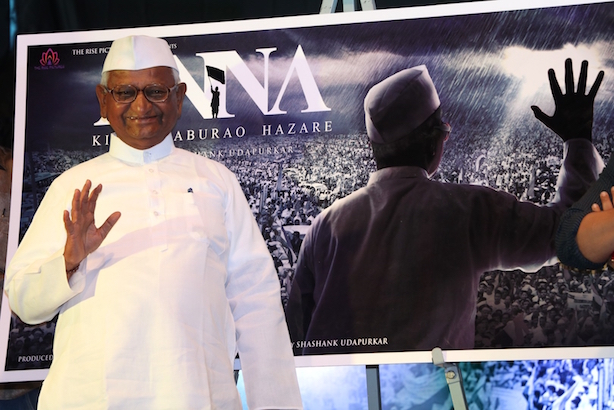Serving the cause of cinema may not be as vital and crucial as serving the nation. However, making a film on the selflessly altruistic life of Anna Hazare, the saintly ascetic man who singlehandedly took on the task of eradicating corruption and failed seems like a task as daunting as nation-building.
Writer-director Shashank Udapurkar must be lauded in no uncertain terms for taking on the uphill task of telling the story so gripped and cramped by socio-political complexities that even Richard Attenborough would have been stumped as to where to begin the task of unravelling the life of a man who went from farmer to national leader without losing his innocence.
The narrative keeps it simple, austere and stripped down. Almost like Anna Hazare himself. There is a certain sincerity of purpose that Anna embodies in his persona. The film assumes a similar role of transparency in bringing to us various vital incidents and anecdotes that shaped the destiny of the man who could have been King but chose anonymity.
The tone is as blunt as a Doordarshan documentary. And that is not an undesirable format to assume, provided the storyteller can pick out moments of revelation from the documentation.
Also Read: Anna Hazare’s biopic releasing on Friday
One could argue sternly against the cult of anointment that elevates figures in a biopic to a demi-god. We recently saw Dhoni being extolled to the point where all his (self-confessed) flaws were swept away in a tidal wave of encomium. “Anna” is even more eulogistic in tone. If at all the saintly man’s weaknesses show up in the narrative, it is to underscore his ultimate moral supremacy.
I sorely missed seeing the human being behind the haloed surface. But then I realized that Udapurkar made the film not to humanize Hazare, but as a fan-boy eager to share his hero-worship with the world.
In that endeavour, “Anna” strikes gold. Very often the narrative assumes the personality of a mythological. We see Udapurkar as Anna posturing in pauranic positions that project him as demi-god. Expectantly, the other characters, including fellow politicians, are reduced to shadowy figures basking the glorious radiance of the king-maker’s humility and benevolence. Capable actors like Govind Nmadeo, Kishore Kadam and Rajit Kapur portray sketchy parts.
There is not doubt as to who endows an epicenter to extolling excursion. Either it’s Anna on screen or other actors talking about him.
As an actor, Udapurkar is reasonably convincing, even as he seems immeasurably convinced of his proximity to the man whom he so nakedly idolizes.
Yes, “Anna” is a two-hour paean to the humble visionary who could have changed the shape and destiny of our politics if only he had not allowed power-politics to be transferred to people around him.
Udapurkar could have taken the biopic to frontiers far beyond Anna Hazare’s public mage. Instead, Udapurkar elects to portray his idol in calendar-art shades. That is an approach not unknown in biopics.
Laudatory and hero-worshipful, “Anna” gives us a vivid broad-stroke look into the life of a man who swept into Indian politics with a hope for change. Alas, Anna was short-changed. The film blessedly manages to stay above the breast-beating of betrayal.
IANS






